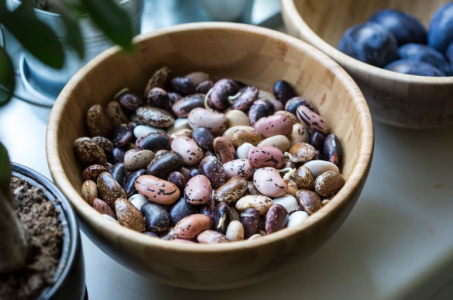Experts are raving about this $2 pantry staple—could it help lower your cholesterol and fight inflammation?
- Replies 0
If you’ve ever breezed past the canned food aisle, it might be time to double back.
A new study presented at Nutrition 2025 has found that humble beans—yes, the $2 pantry staple—could help lower cholesterol and reduce inflammation.
Health experts say these benefits are especially promising for those with prediabetes or heart concerns.
And unlike pricey supplements or trendy diets, this solution is as simple as opening a can.
Beans have long played a supporting role in soups and stews but rarely grabbed the spotlight.
Now, they're trending online and showing up in new dietary recommendations.
Updated US guidelines suggest eating 2.5 cups of beans and lentils per week, up from the previous 1.5-cup standard.
This increase reflects growing awareness of beans’ powerful role in disease prevention.
Researchers assigned 72 adults with prediabetes to eat either a cup of black beans, chickpeas, or rice each day for 12 weeks.
Bloodwork and glucose tolerance tests were conducted at the beginning, mid-point, and end. The chickpea group saw their total cholesterol drop from 200.4 mg/dL to 185.8 mg/dL.
Meanwhile, black bean eaters experienced a decrease in interleukin-6, a key marker of inflammation, from 2.57 to 1.88 pg/mL.
So what’s the science behind this pantry staple’s power? “Beans like chickpeas and black beans are rich in soluble fiber, particularly a type called viscous fiber, which binds to bile acids in the digestive tract,” said registered dietitian Scott Keatley.
Also read: What watermelon really does to your body—and why it deserves a spot on your summer plate
Bile acids are made from LDL, or "bad" cholesterol, which the body pulls from the bloodstream when making more. That process lowers total circulating LDL cholesterol.
Keatley also noted that bean fiber feeds beneficial gut bacteria, which in turn produce anti-inflammatory compounds like butyrate.
Keri Gans, another dietitian, added that beans are high in polyphenols—antioxidants that help reduce oxidative stress.
These factors combined may explain the inflammation-lowering results seen in the black bean group.
“From a clinical perspective, they’re one of the most cost-effective and accessible foods,” Keatley said.
The study focused on eating one cup of beans daily, but experts caution not to dive in too fast. “I recommend increasing your bean intake slowly,” said dietitian Jessica Cording.
That gradual shift can help minimize bloating and gas, which are common when introducing more fiber. Rinsing canned beans also reduces compounds that may irritate digestion.
Beans are also linked to weight management because they keep you full longer, thanks to their protein and fiber combo.
Also read: Snack smarter: The dietitian-backed bite that balances blood sugar and delivers big flavor
While this particular study didn’t show major blood sugar shifts, previous research suggests beans can help stabilize glucose levels.
A 2023 study in Advances in Nutrition found that people who regularly ate beans had a lower risk of death from any cause.
And at under $2 a can, they’re a low-cost way to support long-term health.
Read next: Are beans the best for your health? Why nutritionists think you’re missing out.

Have you added more beans to your diet recently? Noticed a difference in how you feel—or have a favorite recipe to recommend? Drop your tips, stories, and questions in the comments. And if this article got you thinking, share it with a friend who might benefit from a little bean wisdom.
A new study presented at Nutrition 2025 has found that humble beans—yes, the $2 pantry staple—could help lower cholesterol and reduce inflammation.
Health experts say these benefits are especially promising for those with prediabetes or heart concerns.
And unlike pricey supplements or trendy diets, this solution is as simple as opening a can.
Beans have long played a supporting role in soups and stews but rarely grabbed the spotlight.
Now, they're trending online and showing up in new dietary recommendations.
Updated US guidelines suggest eating 2.5 cups of beans and lentils per week, up from the previous 1.5-cup standard.
This increase reflects growing awareness of beans’ powerful role in disease prevention.
Researchers assigned 72 adults with prediabetes to eat either a cup of black beans, chickpeas, or rice each day for 12 weeks.
Bloodwork and glucose tolerance tests were conducted at the beginning, mid-point, and end. The chickpea group saw their total cholesterol drop from 200.4 mg/dL to 185.8 mg/dL.
Meanwhile, black bean eaters experienced a decrease in interleukin-6, a key marker of inflammation, from 2.57 to 1.88 pg/mL.
So what’s the science behind this pantry staple’s power? “Beans like chickpeas and black beans are rich in soluble fiber, particularly a type called viscous fiber, which binds to bile acids in the digestive tract,” said registered dietitian Scott Keatley.
Also read: What watermelon really does to your body—and why it deserves a spot on your summer plate
Bile acids are made from LDL, or "bad" cholesterol, which the body pulls from the bloodstream when making more. That process lowers total circulating LDL cholesterol.
Keatley also noted that bean fiber feeds beneficial gut bacteria, which in turn produce anti-inflammatory compounds like butyrate.
Keri Gans, another dietitian, added that beans are high in polyphenols—antioxidants that help reduce oxidative stress.
These factors combined may explain the inflammation-lowering results seen in the black bean group.
“From a clinical perspective, they’re one of the most cost-effective and accessible foods,” Keatley said.
The study focused on eating one cup of beans daily, but experts caution not to dive in too fast. “I recommend increasing your bean intake slowly,” said dietitian Jessica Cording.
That gradual shift can help minimize bloating and gas, which are common when introducing more fiber. Rinsing canned beans also reduces compounds that may irritate digestion.
Beans are also linked to weight management because they keep you full longer, thanks to their protein and fiber combo.
Also read: Snack smarter: The dietitian-backed bite that balances blood sugar and delivers big flavor
While this particular study didn’t show major blood sugar shifts, previous research suggests beans can help stabilize glucose levels.
A 2023 study in Advances in Nutrition found that people who regularly ate beans had a lower risk of death from any cause.
And at under $2 a can, they’re a low-cost way to support long-term health.
Read next: Are beans the best for your health? Why nutritionists think you’re missing out.
Key Takeaways
- A recent study found that eating a cup of black beans or chickpeas daily for 12 weeks significantly reduced cholesterol and inflammation in adults with prediabetes.
- Chickpeas lowered total cholesterol from 200.4 to 185.8 mg/dL; black beans reduced IL-6 from 2.57 to 1.88 pg/mL.
- Experts credit soluble fiber, polyphenols, and gut bacteria interactions for the health benefits.
- Beans also support gut health, weight management, and disease prevention—making them one of the most cost-effective nutritious foods available.







